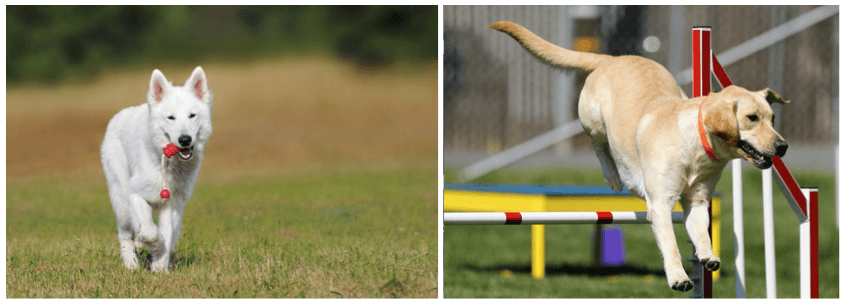Combining a sound knowledge of animal behaviour and practical teaching ability, a career as a dog trainer can be hugely gratifying—professionally and emotionally.
Skills
Becoming a successful dog trainer requires a number of key personal attributes including:
- A clear speaking voice
- Good listening
- Excellent time management
- Patience
- Stamina
- Compassion
- Critical thinking
- Problem-solving ability
- Determination
- A genuine love for animals
“Understanding the sciences of training together with a solid knowledge of dog breeds and their characteristics is essential for dog trainers. However they also need to recognise what is it they are trying to achieve with the owner and the dog,” says Tina Button, PETstock Puppy School and live animal manager.
“You have to be passionate about your work, eager to learn and love dogs, of course. It also helps to be empathetic and a very good listener and observer.”
Education and training
Professional dog trainers need to be highly skilled in various aspects of animal behaviour including socialisation and agility training, teaching to stay and respond on command, decoding behaviour cues and initiating behavioural changes.
In Australia, the two most common accredited courses are the Certificate III in Dog Behaviour and Training and the Certificate IV in Companion Animal Services.
Certificate III in Dog Behaviour and Training
The National Dog Trainers Federation (NDTF) is a government accredited representative and educational organisation for Australia’s dog training industry. It provides the fully accredited VIC Certificate III in Dog Behaviour and Training.
This course introduces a wide range of training methods. Course modules include: the psychology of canine behaviour, obedience training, behavioural problems, teaching complex skills, how to conduct training classes amongst other study areas.
While the NDTF is located in Melbourne, Victoria, the 10-month course can be completed via online learning with practical sessions held in kennel facilities in Melbourne, Sydney or the Sunshine Coast.
There are no pre-requisites for the course, other than the ability to read, write and understand English as well as regular access to a dog for training. To find out more about the Certificate III in Dog Behaviour and Training, including a list of the core units of study, visit the NDTF website.
Certificate IV in Companion Animal services
Tafe NSW offers the Certificate IV in Companion Animal Services. This government-accredited course is for those people wanting to build on their existing skills in the companion animal industry.
The course takes 12-months (full-time) or approximately two years (part-time). It is conducted via a combination of face-to-face and distance learning. While there are various locations for the face-to-face classes, it is worth noting that the six-day workshop completed as part of component three is conducted in Sydney.
Delta Society Australia promotes reward-based training techniques. Units of study include: dog behaviour and positive, reward-based training, training complex behaviours and teaching strategies. Most recently they have updated their training and You can find more information on their website here.
Certificate IV in Companion Animal Services teaches a broad array of topics, providing the relevant knowledge to enter the companion animal industry in various ways. This includes working as a trainer, in an animal shelter, boarding facility, pet shop or other companion animal organisations.
Some TAFE providers also run the Certificate IV in Companion Animal Services. Contact your local TAFE for further information.
Pre-requisites for the TAFE courses include Certificate III in Companion Animal Services and/or significant vocational training and/or work experience across a range of animal work settings.
When it comes to education and training, it’s important to find the right course for your needs. Tina advises, “If you’re interested in a certain training method you need to do your research, choose the course that covers all aspects of training and behaviour that aligns with the method of dog training you want. Speak to other professionals in your industry who may be able to share insights into the different courses.
Laws, permits and legislation
Whether you decide to set up your own dog training business or work for someone else, there are some key considerations.
Under the Local Government act 1993, section 68, to engage in a trade or business on community land managed by Council you need to obtain approval.
Therefore, if you intend to perform dog training sessions in a nearby park you will need to contact your local council to enquire about relevant permits.
As a pet industry professional you will be familiar with animal-related laws but it’s imperative to keep up to date with any changes in legislation and ensure pet owners you work with are aware of any such amendments.
For example, changes were made to South Australia’s Dog and Cat Management Act 1995. The new laws, which came into effect on July 1, 2018, state that all dogs and cats must be microchipped from three months of age, dogs and cats born after this date must be desexed, and increased penalties will apply for dogs that attack or are allowed to wander.
Information about animal welfare legislation in your state or territory can be found on the Department of Agriculture and Water Resources website.

Work experience and industry association
Alongside the theoretical knowledge of behavioural science and training techniques, dog trainers need practical skills, which includes a careful understanding of safe and effective animal handling. This is best achieved through hands-on work experience placements.
While you might already be working in the pet industry, you may like to gain practical experience in other areas.
“If someone is interested in becoming a dog trainer they’re best to start by getting involved on a local level with dog clubs, training centres, day care centres, dog behaviourists or by volunteering at their local shelter. Another great option is fostering for rescue groups,” advises Tina.
As a pet industry professional you’re highly likely to have already built good industry networks, but perhaps there’s the opportunity to broaden those links with allied professionals.
Tina says, “It is extremely important to build networks and create professional relationships with a wide range of pet industry professionals, including vets, veterinary behaviourists, specialist dog trainers (extreme behaviour), registered ethical breeders as well as local shelters and dog clubs.
“Pet professionals should be a member of the Pet Industry Association Australia (PIAA), Australia’s only industry associated created to represent all businesses in the pet industry. The Australian National Kennel Council (ANKC) is the peak body in Australia responsible for registered pure breed dogs, with the aim of promoting excellence in breeding, showing, trialling, obedience and other canine related activities,” she adds.
Costs and earnings
The cost of education will range, depending on the course you choose and the learning structure you take. To give some idea, the cost to do the Certificate IV in Companion Animal Services with the Delta Society Australia is around $4,000. To do the Certificate III in Dog Behaviour and Training with the NDTF costs $3,850 (with the option to do additional paid electives, relevant to police dogs and assistance dogs, if you should choose).
Additionally, if you choose to run your own business, depending on where you intend to operate the business, there may be rental fees, the cost for office supplies as well as the cost for training equipment. This might include: collars, leashes, harnesses, treat bags and training clickers.
Again, depending on the set up of your dog training business, you might also want to consider the cost of insurance. For example, professional indemnity, public liability and personal accident.
As with many businesses, earning potential can vary. However, according to Payscale, the average hourly rate for a basic dog trainer is $20.57. Approximate annual income ranges from $38,432-$62,833.
Career potential
Whether you’re thinking of expanding or changing your career, dog training is a valuable profession—especially given that 38.5% of Australian households have a dog.*
Dog training can certainly offer flexibility with the option to be self employed or work for a larger organization-be it a pet store (for example, offering puppy pre-school), national training group, animal shelter, boarding kennel or veterinary clinic.
Dog trainers may also decide to go on and work in a specialized area such as scent detection dogs, search and rescue dogs, agility dogs, assistance dogs, obedience dogs or police dogs.
Useful resources
National Dog Trainers Federation
Pet Industry Association Australia
The Australian National Kennel Council
* Source: http://animalmedicinesaustralia.org.au/wp-content/uploads/2016/11/AMA_Pet-Ownership-in-Australia-2016-Report_sml.pdf
Latest posts by Liz Walden (see all)
- Pet health: Medicinal cannabis for pets - December 27, 2021
- What pet business insurance do I need? - November 17, 2021
- Pet sitters: how to take time off - November 15, 2021










Dear Sir or Madam
Good day
I am a dog lover and I train dogs, I want to become a professional dog trainer (certified with international certification), I would highly appreciate if you can kindly send me the necessary information.
Hi Zaid, I am sorry but we are not a training organisation, we provide business insurance cover for businesses in the pet industry. Good luck with your search for a course. Regards, Liz
Hi Liz ,
I pet sit as a second job with mad paws , my friend call the the dog animal whisperer haha as I have a natural ability to win over animals. Now I know this means nothing in regards to animal behaviour but I am thinking about mabye learning more to add to my skills and offer training on my profile.
Would it be unrealistic to do this as a part time job ?
Great info, thank you.
Thankyou for your article, you have done all the research for me. : )
Hi I would like to enroll for your course
But I’m a student in India is it possible for me to get a student visa if I enroll for Troy training course .
Sorry we are not a training organisation.
My next door neighbour says he is a dog trainer a precision k9 trainer his dogs bark constantly cry yelp they are caged nearly all day I don’t think he walks them he leaves there poo at the side of the house for days it is everywhere they also bark non stop